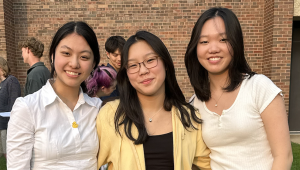Some grads stay in comfort zone, others branch out
September 23, 2016
It’s easy for students to say they’re ready to leave the North Shore, but how do we really cope outside our comfort zone? Is college even a step outside, or are students just jumping into a new bubble.
Students at New Trier certainly understand that they are privileged. We’re told to seek justice for that, told we should strive to make it on our own.
However, it might be more difficult than it sounds to leave behind the comfort of the bubble. Claire Zimmerman, a freshman at Lawrence University, encountered this issue.
“I did want to leave the North Shore area and go somewhere completely different. I felt like the view I had was so limited. But I managed to wind up in a place that’s (respectively) similar,” Zimmerman said.
According to Zimmerman, it was difficult to chose a diverse college. The kind of schools she was looking at, small liberal arts colleges, were often very white.
In fact, a lot of New Trier students end up applying to very white schools. The good education, tutoring help, and college counseling expertise provided by schools like New Trier put those privileged students, many of them white, ahead of others. They make up the majority of those applying to high end schools.
Henry Ewing, a freshman at Tulane University agreed, saying “The people here are wealthy and white, so I think my experience is still inherently different than other kids.”
At some colleges, it’s not just the North-Shore atmosphere that lingers, either. New Trier itself is a well known entity, especially in the midwest college scene.
“The bubble doesn’t ever really go away,” Camille Baer, a freshman at University of Illinois, said, “Especially at University of Illinois where there are so many New Trier kids.”
Sam Petrakis, a freshman at Indiana University agreed that it’s hard to leave the New Trier stereotypes behind. “Everyone hates us,” he said.
According to Petrakis, the bubble is still very much alive. Many New Trier students stick together because it’s just easier than branching out, especially when people have a preconceived perception of New Trier and its students.
Georgetown freshman Sam Roggenkamp recounted an experience of meeting a girl from the Southside of Chicago: “When I first met her, she immediately connected New Trier to Mean Girls.”
Of course, there are also those who strive to leave the bubble behind, journeying into uncharted territory for the average affluent New Trier student.
Musa Abbasi, a freshman at Columbia College, was looking for drastic change. “I didn’t dislike the New Trier area, Abbasi said, “but I was looking forward to leaving the suburbs and going to a city.”
Abbasi chose his school not only based on academics, but by the atmosphere in which he wanted to be surrounded. If he hasn’t popped the bubble, he’s certainly at least stretched it. “I wanted to learn more than academics. I wanted to learn about people too, and what different experiences looked like. It was more than just a numbers game.” Abbasi said.
The unknown can be scary, though. Daniel Cooney, a sophomore at University of Nebraska Lincoln, admitted that adapting to a new environment was fairly difficult. “New Trier really prepared me academically,” he said, “but socially, I felt kind of out of place the first few weeks. I really had to work to open myself to new types of people.”
According to Cooney, however, it is well worth the effort once you adapt: “Being surrounded by so much change really helped me grow. I learned to branch out and interact with everyone, and that transformed into some pretty cool, unexpected friendships.”
Zimmerman agreed that college opened new doors, even when hindered by the bubble. “Everyone seems more open here. I think there’s something about starting fresh in a new place that makes everyone a little more willing to give others a shot, she said. “We’re all here to learn.”











































